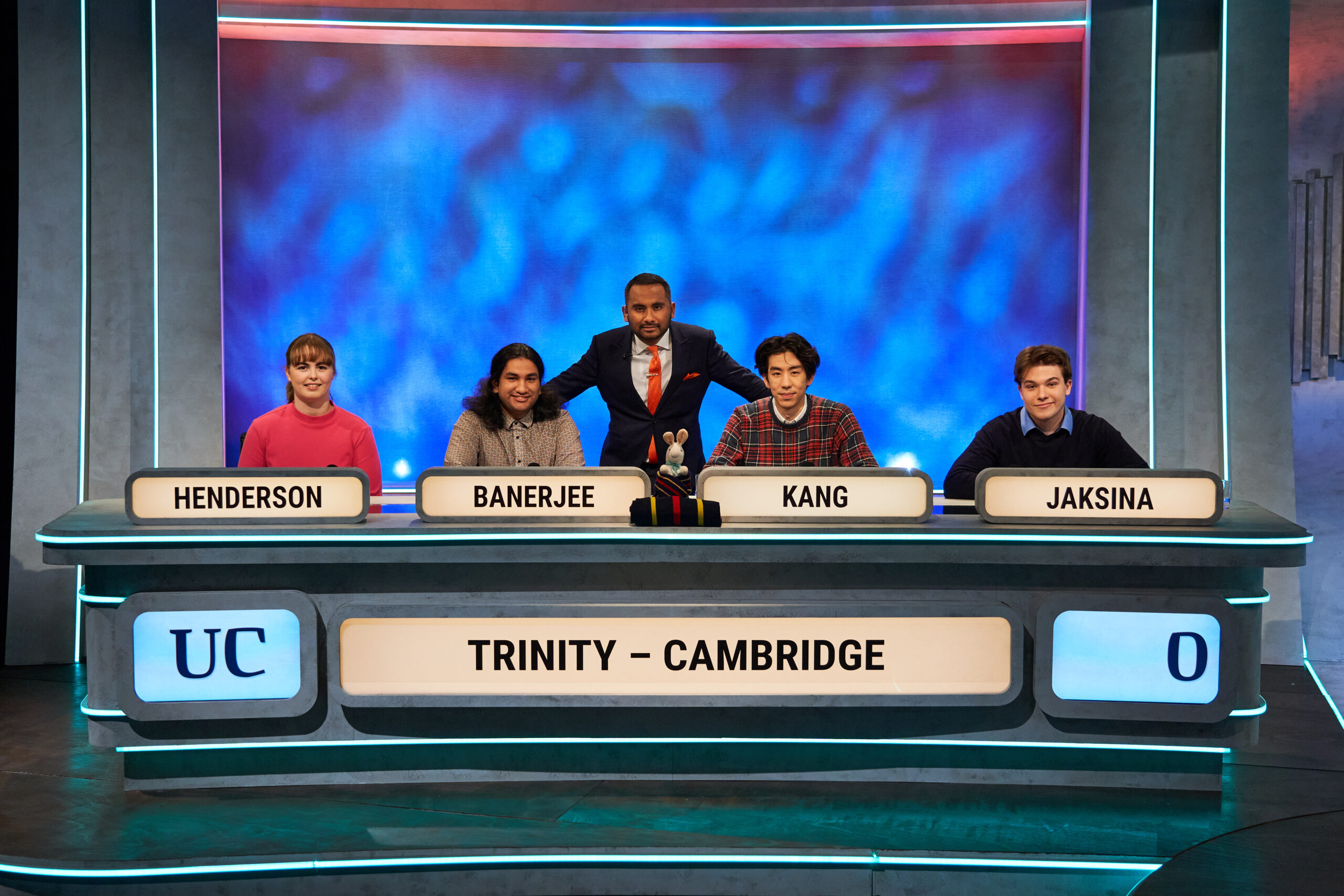
Ryan Kang talks about captaining the Trinity College team for the new series of University Challenge which starts on Monday
It has been one of the most exciting and certainly unique experiences from my time at Cambridge.
Ryan Kang
A Gates Cambridge Scholar is the captain of a University Challenge team which will feature in the new BBC series that airs from next week.
Ryan Kang [2022] is captaining the Trinity College team on the first episode of the new series of the long-standing university quiz, which first aired in 1962. This season Amol Rajan takes over from Jeremy Paxman who previously hosted the quiz from 1994 to 2023.
In line with its high-brow, academic nature, getting onto University Challenge is a fiercely competitive process. Over 100 colleges and universities apply and only the 28 who pass the rigorous selection process make it on to TV. For the Trinity college team this year, the selection process involved a written test and a buzzer round, with questions set by Ryan with help from other previous University Challenge members. Ryan was very focused on putting together a group of people who would cover a wide range of topics and, more importantly, work well together as a team.
Ryan had previously been a reserve for the Trinity team when they were on TV in 2021. At the time he was doing his undergraduate degree, and prior to Cambridge he had no experience of quizzing. Before 2021 he had not even watched University Challenge.
Ryan, who is in his first year of a PhD in Chemistry, but spent much of his childhood wanting to be a zoologist, modestly says he has an ‘okay’ general knowledge of science. Although Trinity has a strong reputation in science and mathematics, his teammates also have keen interests in everything from music to history.
Ryan says the production crew were very supportive and made sure everybody was comfortable. On set, Amol Rajan was very friendly and chatty which helped them to relax. To prepare for the show, the team did some cramming before filming. “It was so much fun,” says Ryan. “All of us love learning new things and so it was basically a condensed version of what we normally do, just with the added pressure of trying to retain it all! I finally made some headway into topics I’ve been meaning to read up on for a long time and learnt so much throughout the entire process.”
Chemistry
Ryan, whose brother is also at Trinity College, was born in the US but moved to Seoul at the age of four. He pursued his secondary school education in the UK and during this time represented the UK in the International Chemistry Olympiad for two years running, an experience which convinced him to do a Chemistry degree.
For his PhD, he is currently investigating new methods for the synthesis of amines, compounds that contain nitrogen, which are important motifs in small molecule pharmaceutical drugs. He is also keen on the application and development of reactions in biologically relevant settings. He says: “As the ‘central science’, I believe synthetic chemistry has a key role to play in the advancement of a wide range of established and emerging fields. The development of new reactions is interesting in its own right, but it can also open up whole new fields of study.”
Ryan says Gates Cambridge has provided him with a supportive network and given him a wider perspective on his studies. “Gates Cambridge scholars are all so active. They are always down for a chat or discussion,” he says. “Chatting with other scholars allows you to get glimpses into other areas of study that you didn’t even know existed. A PhD is so focused and can sometimes feel academically isolating, so it is good to be able to take a step back.”
Keep on quizzing
Students are only allowed to participate in University Challenge once, but Ryan plans to keep involved by mentoring and supporting the next generation of teams at Trinity.
Now an enthusiastic quizzer, he hopes this year’s team can keep competing together in other quizzes together. They have already won the Cambridge inter-collegiate quiz earlier this year.
Ryan says that preparing for and appearing on the show together as a team was one of the reasons it was so enjoyable. Reflecting on his time, he says: “It has been one of the most exciting and certainly unique experiences from my time at Cambridge. I look forward to watching our episode as well as the rest of the matches. I think it’s going to be a bit strange watching ourselves on TV and reliving the moment – I might have to look away when I know I’m about to get something wrong! Maybe I can balance this by pretending to know more than I do by pre-empting some of the questions…..”
*You can watch Ryan with the Trinity College team on BBC2 on Monday 17th July at 8:30 pm and follow the rest of the series every week.












